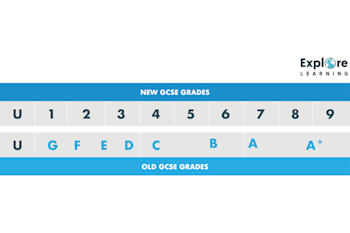A guide all about GCSE maths
Not sure where to start when it comes to the GCSE exams? Don’t worry we’ve got you! Here you will find all the information you need to support your child in achieving their potential in their exams.

Looking for GCSE maths support? You’ve come to the right place!
Our ultimate guide to GCSE maths will cover all the topics you need to know about the GCSE maths course and exams.
GCSE maths timeline: key dates
Going through the GCSEs is like taking a long, but highly rewarding, journey. Generally, students begin the GCSEs in year 9 or 10 and conclude in the spring/summer terms of year 11. This makes the overall duration around 2 – 3 years, depending on the school and exam board you follow.
There are some exceptions to this full time study, where adult learners can join the GCSEs by taking evening classes or self-studying. With GCSE short courses available for some subjects, the GCSE can be open to anyone and everyone, no matter the qualifications or age.
Typically, students begin revising for the GCSEs in January, but of course, this differs from student to student, and each person usually sets their own timeline. The primary exam period of GCSEs begins from around mid-May until the end of June in year 10 and 11. After that, students normally receive their results in the third week of August. On the famous day, GCSE “Results Day”, students should expect to receive their results starting at 8 a.m. Please don’t worry if they come out a little later than that. We know, waiting for results can be nerve-wracking, but you’ll receive them!
However, keep in mind that each exam board has a different timeline, so you can look out for your individual exam boards websites as well. Below are the main UK GCSE maths exam boards links, where you can find key dates, important information about the courses, and some downloadable resources!
The 9-1 GCSE grading system
Familiarising yourself with and understanding GCSE results is the best first step you can take to help your child prepare for their GCSEs.
When you think of GCSEs, you probably recall the time between 1988 and 2016, where students could achieve scores between A to G. In 2017, this letter-based marking scheme, A*, A, B, C, D, E, F or G, was replaced with a 9 – 1 numerical scale, where student papers could receive a 9, 8, 7, 6, 5, 4, 3, 2 or 1.
The highest marks in the new 9 – 1 GCSE grading system are (9, 8 and 7), which equate to the previous A* and A letter grades. In this new grading scale, however, only the top 20% of the paper graded achieve a 9. We know it’s a bit confusing, but here’s a simple table to show you how the new grading system works in comparison to the old one:

GCSE exam boards
As mentioned before, there are several exam boards throughout the UK. To take a step back, an examination board is a self-standing organisation that creates GCSE exams, marks them, and distributes the results to students. Despite following different routes, each exam board is regulated and monitored by the Office of the Regulators of Qualifications (Ofqual), so that they are all up to the national standard.
Each school decides the exam board they use, and sometimes, the schools can even choose to have different exam boards for different subjects. If you’re ever hesitant about which exam board your school follows for different subjects, we recommend you check the school website or give them a call!
To make things easier for you, here’s a quick summary of the three most used exam boards across the UK and around the world:
AQA
The Assessment and Qualifications Alliance (AQA) GCSE exam board is responsible for over half of all GCSEs and A-levels taken in the U.K. per year. This independent charity organisation is all about student growth, cutting-edge research, and helping students realise their full potential.
Find out more about AQA here.
Edexcel
Available in over 40 subjects, the Edexcel exam board is one of the largest in the U.K. On their website, you can view the different courses they offer, including GCSE maths, and download the course details. You can also look at the needed Edexcel GCSE maths textbook and available resources.
Check them out here.
OCR
The Oxford, Cambridge and RSA Examinations (OCR) is one of the leading UK awarding bodies. They take pride in their general and vocational qualifications, which help students acquire the knowledge and skills needed to excel.
Learn more about their GCSE maths here.

Entry tiers explained: foundation or higher?
Students taking the GCSE exams will be required to choose between two different course tiers: foundation tier courses and higher tier courses. It is really important to carefully select the type of course you want to take, as the decision can impact your post-GCSE and career plans. Below are some key differences between both options:
Foundation Tier Courses
These courses are designed to contain less content than higher tier courses, which means they give you an opportunity to focus on the limited course material and that the exam papers are easier to sit. Having that said, the maximum grade that can be obtained is a grade 5. Many universities throughout the U.K. require a grade 5 or higher as entry requirements, so they could limit your university options later on. Most importantly, with the smaller grading scheme, more marks are required to pass foundation tier courses, which makes the emphasis on the results greater than in higher tier courses.
Higher Tier Courses
Contrary to the foundation tier courses, the higher tier courses are grades between 9 -1, where the maximum grade obtained can reach 9. This means that students need fewer marks to pass and a higher chance to get the grades required for university entrance. With this in mind, the content needed to cover for higher tier courses is greater and more difficult than that of foundational tier courses. The exam papers are also typically harder and contain longer, more in-depth questions.
In a nutshell, it is important to research the most important courses related to the career field you think you would like to pursue. This way, you could aim to take these subjects in the higher tier level, and take other, less relevant subjects, in the foundation tier level. Simply, this allows you to get higher grades in these necessary subjects, which can help you secure the university you want to join.
GCSE maths subjects and course content
Our GCSE maths course is designed for students in years 9 – 11. Our course materials, mock papers, and maths topics support students sitting the AQA, Edexcel, Eduqas or OCR exams.
Generally, the GCSE maths course provides students with an opportunity to develop a positive attitude towards mathematics, be able to use mathematics in their daily lives, and set a strong mathematical foundation for students who want to pursue mathematics at a higher level.
Our maths syllabus, in alignment with the governments’ GCSE specifications, allows students to:
Develop an in-depth understanding of mathematical concepts, methods, and skills
Acquire and apply different mathematical techniques to solve problems
Develop adequate mathematical reasoning, make inferences, and draw conclusions
Interpret and communicate different mathematical information.
GCSE maths exam format
Choosing an exam board for your maths GCSE can be a big decision, since there are many different factors to consider before settling on one. Each exam board has their own values and targets, which reflects in the way they create the exams. The primary difference between each maths exam is the question style, format of exam, and resources available.
The main difference between the exam boards is their style of questions, which we’ll tell you all about below:
Edexcel exam board
The Edexcel maths exam questions, in line with their philosophy, are designed to be written in clear and simple language. There are a total of 3 exam papers, 90 minutes each. Students complete the first paper without a calculator, and the other two with calculators. Each exam is marked out of 80, which totals to 240 marks.
AQA exam board
The AQA exam questions start out with multiple choice, then transition to short and long answer questions. They believe that their exams and courses should be designed to make students enjoy and succeed in maths. The number of papers, time of exam, grading scheme, and calculator use is exactly the same as the Edexcel exam board.
OCR exam board
The OCR exam board strongly believes in designing authentic and real mathematical contexts for students. They highlight that their questions are clear, easy to comprehend, and digestible by students. The OCR exams slightly differ from the previous two in that they are 3 papers, 90 minutes each and graded out of 100, which totals to 300 marks overall. The first paper is done using a calculator, the second without, and the third with.

GCSE maths exam resources online
There are thousands of free resources out there that can help you prepare for the GCSE maths exam. In addition to our carefully-designed maths course, where you will receive revision guides, homework support, and individual help, you can check out some of the below free GCSE maths revision resources.
GCSE exam practice papers
Additionally, taking different GCSE past exam practice papers is extremely important in learning about exam techniques, testing your knowledge in the subject, and revising for your exam. Here are some GCSE maths revision resources, where you can create revision cars, look for exam papers, and learn about various exam techniques and skills.
How to prepare for GCSE maths exams
Typically, students begin revision for the GCSE maths exams starting January, but it is important to say that each person has to set their own timeline with what works best for them.
You can start preparing for your GCSE maths exams by asking your tutor any questions you may have, discuss any confusing topics, or revise your most common mistakes with them. You can also do some exam preparation by accessing free maths GCSE resources online and doing as many questions and exams as possible.
Top tips for exam success
Exam preparation can be stressful and tricky, but don’t worry, we’ve got your back! Here are some of the most important tips we recommend you follow for GCSE exam success:
When in doubt, always ask for help about concepts, questions, and methods.
Use the time you have with your tutor to have them explain and walk you through difficult concepts.
Look out for your mistakes trends in different questions and make sure you address these mistakes with your tutor.
Set a schedule for your exam practice times and make sure you follow it.
Make sure to take breaks and be proud of your achievements, no matter how small they are!
Sitting the exams: what to expect on the day
Exam day can be very stressful for students and parents, but never let the stress of the exams get to you.
You’ve come a long way in your studies and you made it so far, now it’s showtime! Don’t get up early before the exam to revise. This will make you tired and could compromise your success in the exam. Instead, have a good breakfast, listen to your favourite songs, and take three deep breaths before you begin.

GCSE results day
Everyone waits for GCSE results day, but everyone is nervous about them! Having these mixed feelings about exam day is completely normal. Waiting for your results to come out can be very nerve-wracking and stressful, but no matter what happens with your results, there’s no need to panic.
Take your time to think about your scores and what this could mean for you. A lower score on the GCSE exam doesn’t have to mean that you’ve failed. At the end of the day, what truly matters is how much you were able to grow and learn from the entire journey.
Beyond GCSE maths
Some schools may offer the opportunity to take other GCSE maths courses, including statistics and further maths. Based on your anticipated career path, it could make sense for you to pursue one or the other.
Finally, it is important to say that learning about maths does not stop with GCSEs. The primary goal of all exam boards is to prepare students for any other maths courses they wish to pursue in school, university, or beyond.
FAQs: GCSE maths
When should GCSE revision start?
Typically, students begin revising for the GCSE starting January, but of course, this differs from student to student, and each person usually sets their own timeline. The primary exam period of GCSEs begins from around mid-May (14th) till the end of June (22nd), which gives students about 5 months in advance to begin revising for GCSEs.
Do I need a maths tutor for GCSE exams?
We are biased when we say yes, of course, but having a GCSE tutor for the exams can really make a difference in your confidence and knowledge of the course. Our GCSE maths tutors ensure that students tackle any difficult concepts, are fearless in their exam revision, and have the necessary skills needed for the exam. Our maths tuition programs, designed for children as young as the age of 4, also help prepare you for the GCSE indirectly. You can find out about the importance of having a maths tutor here.
How can I help my child succeed in GCSE maths?
There’s many different ways you can support your child with GCSE maths. First, you need to be their #1 cheerleader and supporter. This helps boost your child’s confidence in their abilities and their will power to perform better in the exam. Second, you can set together a schedule, where you balance study, sports, play, and fun. This schedule can help you focus your attention to the tasks at hand and not get distracted or lose focus. Last, you can speak with our experienced maths tutors about what your child needs and how they can support your child, this way you can ensure that they’re receiving the right help for them.
What’s a good grade for GCSE maths?
This is highly subjective and can differ from one person to another. According to the Education Policy Institute, the average grade for GCSE maths in 2021 was 5.2. If your child achieved a score around this number, this means they are within the average range of scores. If they are in the upper end of that number, it means their score is above average, and if it is lower, it could suggest that it is below average.
Discover our GCSE maths programme
You now know the most important information about GCSE maths. Now, what are you waiting for? You can discuss any further questions you may have with one of our experienced tutors by booking a free trial session today. It’s never too late or too early to begin, the most important thing is that you take a step forward!
Cancel anytime
No joining fee
In centre or online
Memberships to suit you
Cancel anytime
No joining fee
In centre or online
Memberships to suit you
Cancel anytime
No joining fee
In centre or online
Memberships to suit you




